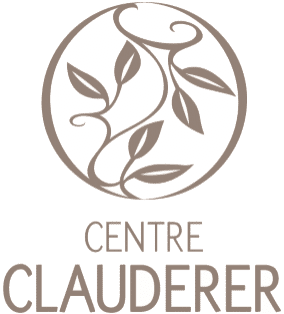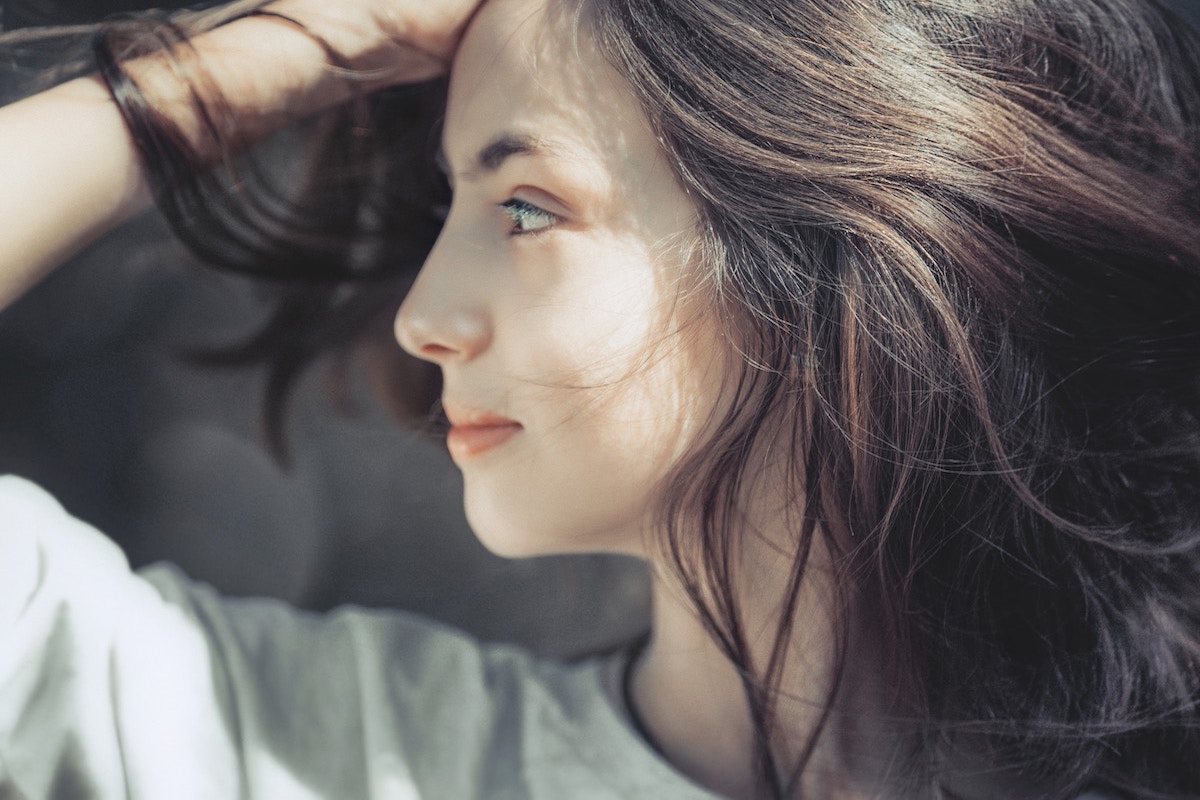Do you wake up every morning with the urge to wash your hair, even though you last shampooed it the day before? Do you find that your scalp gets greasy too quickly, and do you sometimes feel embarrassed by the unkempt image that your flat, greasy locks can give people? To combat the scourge of greasy hair, you rub your scalp vigorously every time you shampoo and, for greater effectiveness, you've decided to do 2 shampoos one after the other. Unfortunately, the very next day your hair is just as heavy and you're dreaming of an effective treatment to prevent greasy hair. There's no universal remedy for oily hair and scalp but - good news! - there are several solutions to deal with the problem. Between bad practices to forget and good gestures to adopt, follow our expert advice to find out how to stop greasy hair.
First of all, to properly deal with the problem of oily hair, you need to know what is meant by "having oily hair". At what point can you say you have an oily scalp and (overly) oily hair? And then you need to identify the cause: why is my hair greasy?
From then on, it will be easier to know what to do to avoid greasy hair. Finding a treatment or solution to oily hair involves eliminating as many of the causes as possible and putting in place a series of good habits (including a hair routine and the right care products). In other words, turning a vicious circle into a virtuous one!
When can I say I have oily hair?
Strictly speaking, there is no objective criterion for determining when someone can be considered to have extremely greasy hair. However, people are considered to have excessively greasy hair when they have washed their hair at night before going to bed and wake up the next morning with hair that is already greasy to the point where they need to shampoo it again.
Why do I have greasy hair?
It is sebum production, which is at the root of the problemor, more precisely, the abnormally high quantity that causes it.
Sebum production. Sebum is produced by the sebaceous glands at the base of the hair. Essential for maintaining a healthy, moisturised scalp, sebum also protects the hair from pollution and dehydration.
Under normal circumstances, this sebaceous gland, whose activity is regulated by hormones, primarily testosterone, secretes a moderate amount of sebum. The primary role of sebum is to help protect the skin: combined with cutaneous perspiration (evaporation of water by the skin without apparent sweating), sebum makes up the hydrolipidic film which represents a real protective barrier for the skin and scalp. Sebum is also essential for lubricating the hair fibre. In both men and women, the activity of the sebaceous glands, and therefore the secretion of sebum, is governed by androgen hormones. When the sebaceous gland is 'hyper-active', too much sebum appears on the scalp and the lengths of the hair. Depending on your genetic make-up, oily hair can affect anyone, men or women, without distinction.
The basis of an anti-oily hair treatment :
how to wash oily hair and scalp effectively
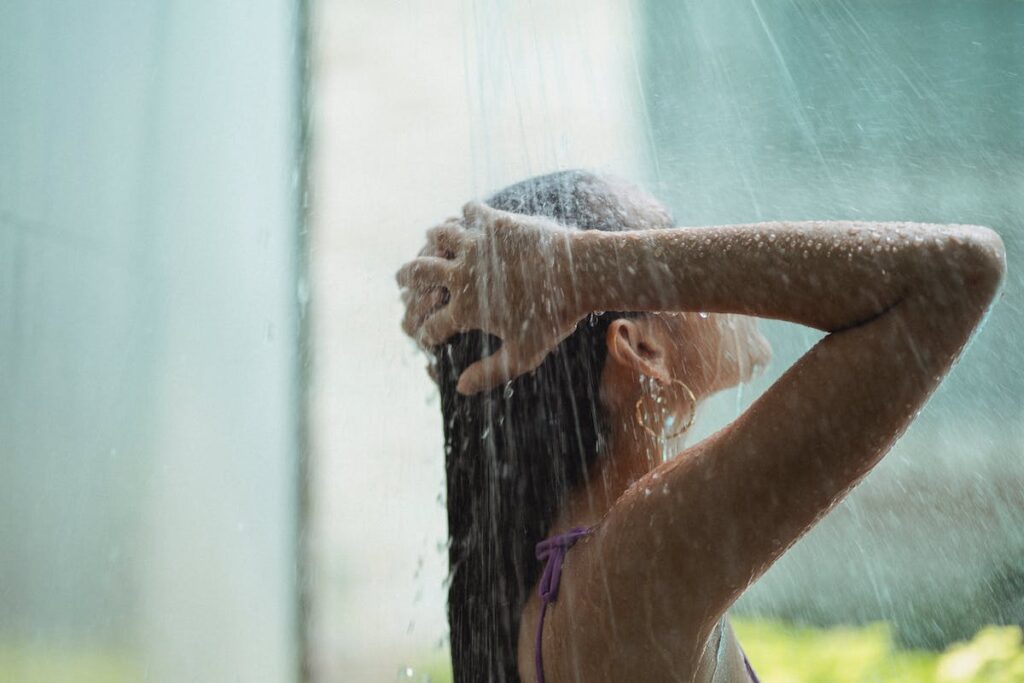
Oily hair and scalp: our advice
Choose the right shampoo to wash greasy hair
Contrary to popular belief, we advise against avoid using an anti-seborrhoeic shampoo. Most of these products are alcohol-based. They may produce an immediate beneficial effect, but with repeated use, they will alter the pH of the scalp and ultimately trigger excessive sebum production.
Similarly, choosing "baby" shampoos thinking that they'll be gentle enough to use every day is a bad idea, as the label doesn't mean "ultra-gentle" but "doesn't sting the eyes". In fact, these shampoos contain superfatting agents useful for young children's hair but useless or even harmful for the health of teenagers' or adults' hair. This type of solution as a treatment for oily hair is therefore totally counter-productive.
The right routine for washing greasy hair
Of course, everyone should be able to wash their hair according to how they feel. However, we recommend avoiding washing your hair more than once a day, even if you have really oily hair. You should also choose your anti-oily hair shampoo with care. A shampoo suitable for oily hair will therefore be an ultra-gentle shampoo with a neutral pH (7), i.e. neither acidic nor alkaline, which does not irritate the scalp and allows frequent washing. Two mistakes to avoid: leave the shampoo on and wash your hair several times. Leave the shampoo on will lead to prolonged contact between the cleansing agents in the shampoo and the scalp, ultimately stimulating sebum production. Washing twice in succession also produces the same effect. Both should be avoided.
Watch the water temperature
For the more daring, here's a really effective ritual: wash and rinse your hair in warm water, as heat is a powerful stimulant for the sebaceous glands. A little extra: rinsing with lukewarm water and then rinsing for a long time with cold water is very effective in soothing the sebaceous glands and often means you can space out your shampoos.
What about scalp massage - a good idea or a bad one?
Do not massage the scalp while shampooing, This stimulates the secretion of sebum and makes it start to work again. Massaging the scalp while shampooing is a very common mistake. Massaging" is often confused with "rubbing" or "scrubbing"! Shampoos are designed and formulated to wash the hair, not the scalp. However, twice a week before shampooing, giving your hair a "pinch" massage is an excellent way to get rid of excess sebum from your scalp.
What else can you do to combat greasy hair: our advice
Solution for oily hair and dry ends
In the case of hair that is greasy at the roots and dry at the ends, which is often the case for women who colour and manipulate their hair too often, try to "hold" it for an extra day so that the lengths are not in a state of "dryness". Avoid too much contact with the washing product, which has a drying effect. If you use a conditioner or moisturiser after shampooing, apply these products to the lengths and ends of the hair, but never to the scalp.
Styling : precautions to take in the event of oily hair
Avoid blow-drying your hair too hot. Hot air artificially dries out the skin and causes it to secrete more sebum as soon as the hair is dried. In short, heat, whether from water or the hairdryer, is an enemy of oily hair.
Brushing too vigorously with unsuitable tools (plastic brushes or combs, for example) can not only further stimulate sebum production but also prevent it from being distributed evenly throughout the hair. Choosing a boar bristle brush allows sebum to be distributed naturally and effectively (so that it can better play its role in protecting the hair fibre and no longer stagnate on the scalp); for curly, very curly hair, we'd rather opt for a horn comb with naturally antistatic properties.
Choosing the right mask to avoid greasy hair
Masks containing tannin plants - such as burdock - which cling to the hair by natural affinity, tone it and absorb sebum while allowing the scalp to breathe. This is the best topical remedy for oily hair. However, if your hair is dry at the ends, you should apply these treatments only on the scalp and the first centimetre of hair.
Sea bathing and oily hair: a natural remedy?
The sea is a wonderful natural treatment for oily hair. People whose hair gets greasy too quickly during the rest of the year are generally very happy at the seaside. Their scalp becomes less greasy and their hair lighter: not with the sun which makes the scalp sweat and stimulates sebum production, but thanks to seawater, salt and plankton, which purify and tone the scalp. Quite simply, this cocktail has a 'blotting' effect that encourages the elimination of sebum accumulated in the hair follicles and cleanses the scalp. This draining and cleansing effect on oily scalps can be enhanced by massaging the scalp with your head under water.
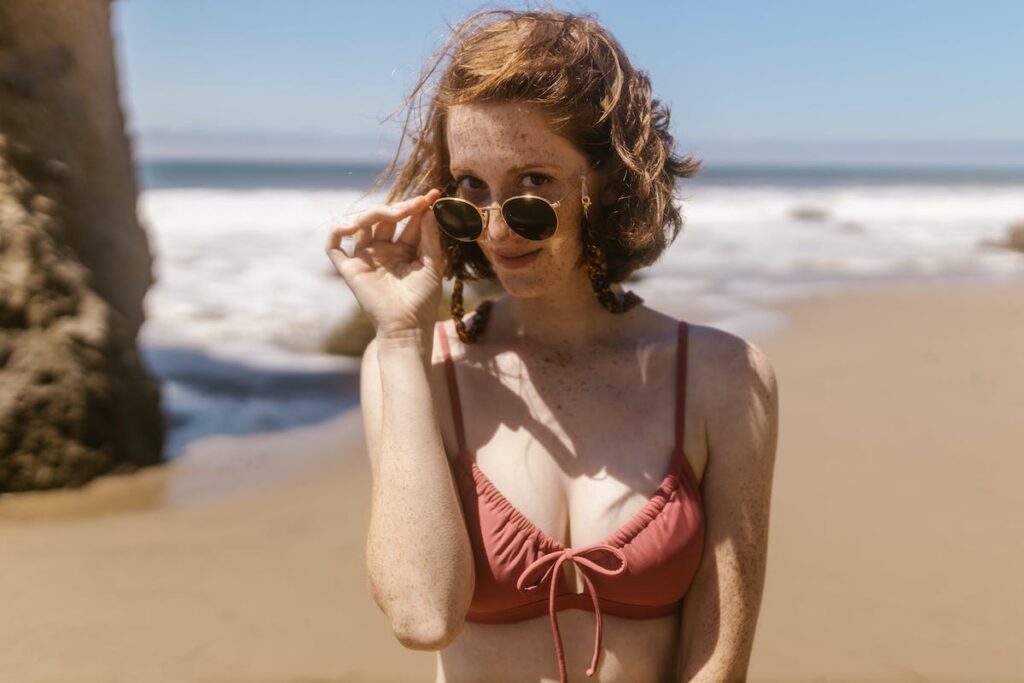
Oily hair and sea bathing: does it work?
To retain all the benefits of these sea baths, it is essential to rinse thoroughly every evening with fresh water, or even use an ultra-gentle shampoo. Otherwise, the salt will remain on the scalp and will no longer have a 'blotting' effect but an 'occlusive' effect: it will prevent the sebum from draining away normally and stimulate the sebaceous glands once again.
Oily hair care by Clauderer
La anti-oily hair solution recommended by Clauderer is made up of 2 complementary products that act by synergy on the scalp for a effective and long-lasting treatment :
In addition to choosing a purifying shampoo (Emulsion n°17), whose active ingredients (illite clay in particular) absorb excess sebum production (oil) from the scalp and gently cleanse the hair thanks to a gentle cleansing base, we recommend applying a Lait Clauderer to ensure perfect hygiene. whose active ingredients regulate excess sebum. Applied before shampooing, this purifying treatment, which contains essential oils and group B vitamins (essential for the health and beauty of the hair), is ideal for cleansing the scalp over the long term. If you suffer from dandruff or itching, a purifying milk will also have a soothing effect from the very first applications. Of course, each case is different and only an in-depth hair diagnosis will enable your Specialist to identify the products you need.
Aggravating factors
Stress and oily hair
Having a stressful life is not unusual these days. And yet, without us being aware of it, stress triggers a whole series of internal physiological reactions that lead to stimulate the adrenal glands. The adrenal glands then release increased quantities of 3 hormones: adrenaline, cortisol, which enables the body to mobilise more sugars to meet its increased energy needs, and... androgen hormones produced by the adrenal glands. These have a stimulating effect on the activity of the sebaceous glands. Result: stress will make your hair even greasier. Combating stress is never easy, but (re)exercising, doing a creative activity or something else you really enjoy, taking time out for yourself, etc. are all part of the simple steps you can take to reduce stress.
Diet and oily hair
Stress can make you less careful about what you eat. Unfortunately, that's what you need to avoid when you have oily hair! Anything based on industrial sugar: pastries, sweets, white bread and rice, fast food, etc. will stimulate the activity of the sebaceous glands. What's more, these foods upset the acid-base balance in favour of acidic foods.
This excess acidity will also increase sebum production and make hair even greasier. On the other hand, increasing your portions of green vegetables and fruit is a very good way of slowing down sebum production... but that's not all: better eating habits will benefit you throughout your life, so don't wait to take care of yourself!
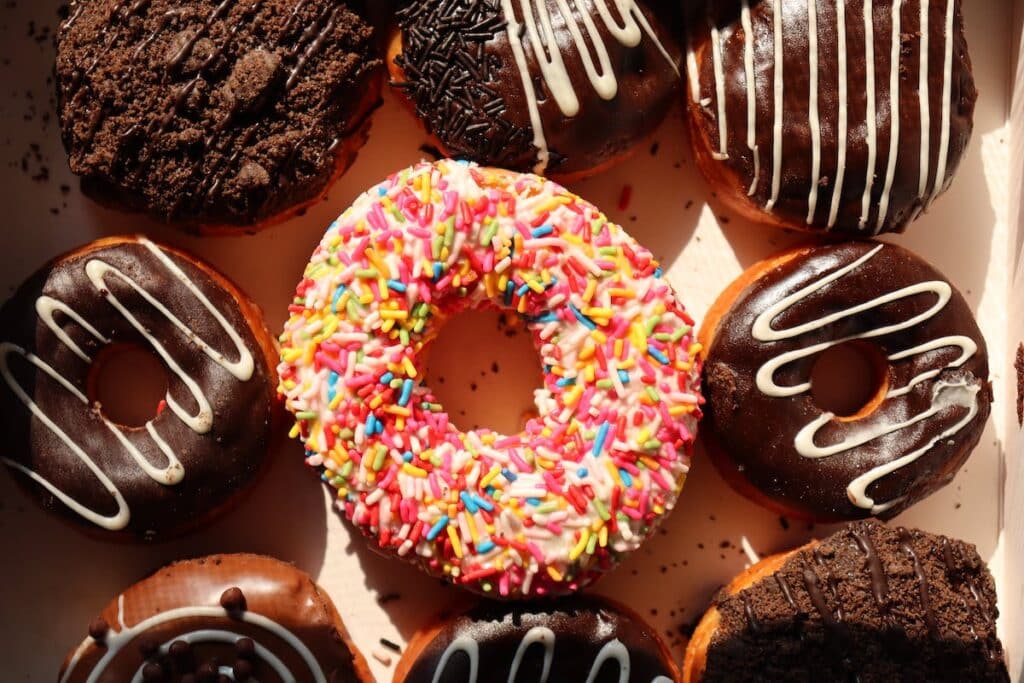
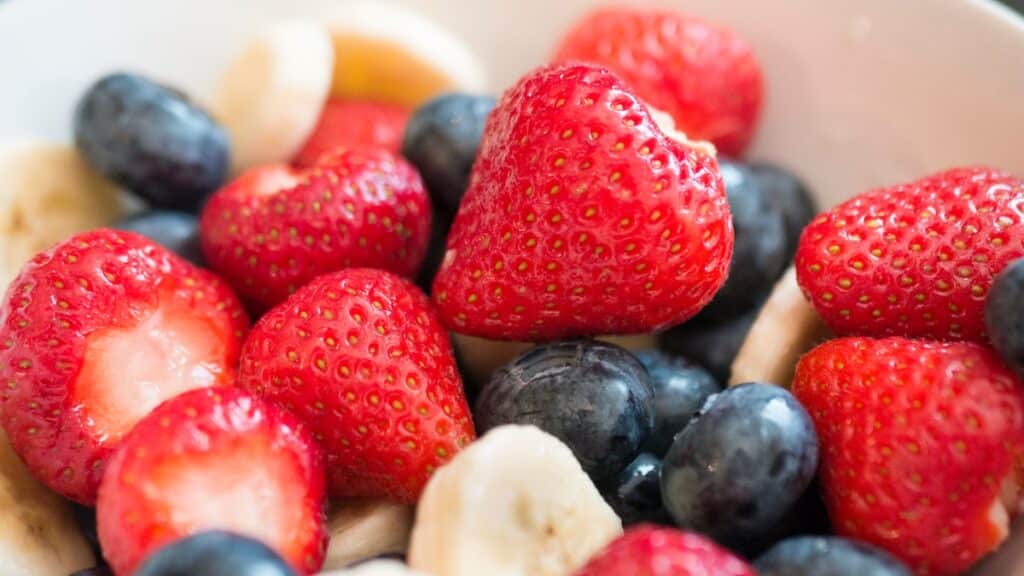
Enemies or friends of greasy hair: sometimes you have to choose!
Choice of contraceptive and greasy hair
An third or fourth generation oestroprogestogenic pill can can help limit the production of sebaceous glands and make hair significantly less greasy. Most pills combine an estrogen in varying doses (some contain no estrogen) with a progestogen.
The progestin used in 1st and 2nd generation pills is a testosterone derivative. It produces an effect similar to that of male hormones, stimulating sebum production.
The progestins used in 3rd and 4th generation pills are considered to be 'non-androgenic' (desogestrel, gestodene or norgestimate) or even 'anti-androgenic', such as drosperinone (Jasmine) or chlormadinone acetate (Belara). In addition to the nature of the progestin, there are also the dosages used and the progestin/oestrogen balance. The oestroprogestogenic pill is still a drug, and the decision to use one or other is a decision to be taken in consultation with your gynaecologist or GP.
And also :
Oily hair, dandruff and itching
Dandruff and itching are caused by a microscopic fungus called pityriasis. This microscopic organism is naturally present on all scalps and usually remains inactive. As it feeds on sebum, it prefers oily scalps.This is an environment in which it can proliferate more easily. Its proliferation causes an acceleration in the renewal of scalp cells (hence the appearance of dandruff) and leads to the production of acids, which in turn cause itching.
Oily hair and hair loss
If your hair suffers from progressive alopecia (see men's hair loss, women's hair loss), an excess of sebum can accelerate the process of impoverishment of your hair and lead to the production of new hair that is thinner and thinner. In fact, some of the sebum will remain in the hair follicle, "suffocating" the roots and slowing down exchanges with the blood that provides them with the nutrients they need to produce keratin, and therefore hair growth.
This phenomenon is not visible to the naked eye, but is easily detected by microscopic analysis of the hair roots: you can see that they are surrounded by a black mass which is in fact all the sebum that has not flowed outwards and is clogging up the hair follicle. However, excess sebum production is never the main cause of hair loss but rather an aggravating factor.
Answers to your questions about oily hair
Why do I have greasy hair?
Secreted by the sebaceous glands associated with hair follicles, the main function of sebum is to form the hydrolipidic film, an essential protective layer for the skin and scalp. Having oily hair in this sense is virtuous. But sometimes it's too much, especially when you have fine hair that quickly takes on an oily appearance. Sebaceous gland activity is controlled by androgen hormones, so there's nothing you can do about it. On the other hand, it's quite easy to slow down the production of this unsightly oil by taking a few simple steps.
How can I stop having greasy hair?
Clauderer advises you to shampoo your hair once a day with lukewarm water, then rinse thoroughly and thoroughly with cold water. Choose a ph-neutral shampoo, especially not a baby shampoo. A healthy diet can also make hair less greasy, so eat plenty of fruit and vegetables and unrefined sugars - in short, avoid junk food!
Is it a good idea to leave your hair greasy?
In vogue in the United States in particular, the 'low-poo' method involves applying as few products as possible to the hair to avoid damaging it. As its name suggests, no-poo means not using any shampoo at all. Everyday ingredients are used to absorb sebum and rid the hair of dust, with bicarbonate of soda and a cider vinegar rinse. In both cases, the aim is to space out the washes so as not to over-stimulate the sebaceous glands. Finally, the "sebum cure". The aim is to "last" a month without washing your hair. The idea is to allow the sebaceous glands to self-regulate and find their natural rhythm, without over-stimulation from hair products. After a final shampoo, brush your hair thoroughly every day, using a clean brush of course. The promise: shiny, toned hair that grows back faster. As for us, we haven't observed any beneficial effects from this 'cure', rather the opposite.
